IT help desk is the first port of call for everything — from a printer that won’t power up to a major cybersecurity incident. While the range of service cases vary wildly in terms of urgency and importance, successful organizations know that fast, reliable resolutions are the backbone of productivity. Of course, the expertise of your service agents is critical (they’re the human face of support), but they also need a quality service management platform enabling them to perform at their best.
Whether you’ve been using Jira’s service desk offering for a while, or just want to rank it against other market options, this guide is for you. We’ll explore 10 Jira Service Desk alternatives, including their pricing, key features, security, and real-life reviews. If monday service fits your plans like a glove, we’ll also show you how easy it is to transition across to our top-rated service management platform.
Try monday serviceKey takeaways
- Jira Service Desk, now known as Jira Service Management, is a powerful ITSM tool sometimes criticized for its steep learning curve, incomplete self-service features, and performance issues at scale.
- The best Jira Service Desk alternatives offer easy adoption, strong multichannel support, built-in automation, and transparent pricing.
- Security and compliance should be non-negotiable when evaluating service desk software. Look for certifications like ISO 27001, SOC 2, and GDPR compliance.
- Small businesses, mid-market teams, and enterprises will each benefit from different alternatives, ranging from lightweight free options to enterprise-grade platforms.
- monday service stands out as a best-in-class Jira alternative, with a 4.7 G2 score, AI-powered workflows, and flexible no-code customization designed to help teams resolve requests faster.
What is Jira Service Desk?
If you’ve been researching IT service management (ITSM) platforms, you’ve probably come across Jira Service Desk. Atlassian officially created Jira Service Desk in 2013 after noticing that 40% of Jira users had already adapted the platform to handle service requests.
In 2020, Atlassian expanded its service management offering and rebranded Jira Service Desk as Jira Service Management. While many people still use the old school name in reviews and discussions, Jira Service Management is the current product Atlassian develops and supports.
Here’s how Dineshkumar P., a System Engineer, rates Jira Service Management.
“What I like best about Jira Service Management is how seamlessly it helps manage IT support tickets through customizable workflows, automation, and SLAs. It improves visibility across teams and keeps everything well-organized in one place. The ability to integrate with other Atlassian products like Confluence and Jira Software adds a lot of value and streamlines collaboration between development and operations teams.”
The G2 user community provides Jira Service Management with a reliable score of 4.3 out of 5. Digging into specific category scores (out of 10) here’s how the platform fares:
- Ease of use = 8.2
- Ease of setup = 8.0
- Ease of admin = 8.0
- Quality of support = 8.4
Why you might need a Jira Service Desk alternative
Jira Service Management delivers strong capabilities, especially for teams already invested in the Atlassian ecosystem. But for organizations seeking easier adoption, other platforms may be a better match. Here are the specific reasons you might want to look beyond Jira Service Management and discover what else is out there.
Steep learning curve
When adopting a new service desk, speed to value is critical. The sooner agents, managers, and even non-technical staff can pick up the platform, the faster they can resolve tickets and deliver support. A system that requires extensive training or feels overly complex can slow down adoption and reduce efficiency.
Unfortunately, many real-world reviewers on G2 mention challenges with onboarding and ease of use, often saying it feels like you have to “build the platform from scratch” to get it working. Mauricio L., an account executive, describes their experience:
“I think Jira’s weak point is ease of use. It is a tool that has a fairly slow learning curve and is not as intuitive for users not in the Technology environment. Added to that, their IT asset manager is not that good.”
Missing features
A strong service desk should provide a full suite of tools, like a self-service portal, knowledge base, change management, and asset tracking, to help both agents and end users. Gaps in these features often mean teams need to rely on workarounds or additional tools, which adds complexity and cost.
Several IT reviewers point out that Jira’s self-service portal feels incomplete, with one IT user calling its “feature set … very weak.”
Sluggish performance
In service management, reliability and responsiveness are non-negotiable. Platforms need to perform consistently even under heavy workloads, such as complex workflows, or ticket volume spikes. If the system lags, teams risk slower response times, SLA breaches, and frustrated users.
According to reviewers, Jira Service Management can struggle at scale. Shiva Shakthi M., a business development executive noted that “performance can slow slightly with very large datasets or projects,” while another education management user observed that “performance can lag when handling a large volume of tickets or custom fields, which can impact efficiency in high-demand environments.”
What should you consider when choosing a Jira Service Desk alternatives?
When shopping for service desk software, focus on finding a solution that fits the way your team works today and scales with you tomorrow. Use the following as a checklist as you evaluate Jira Service Desk alternatives.
Core features
- Does the platform support incident, problem, and request management?
- Does it provide a knowledge base and self-service portal?
- Does it include change, release, and asset management?
Ease of use
- Is the interface clean and intuitive for agents and users?
- Can non-technical staff learn and use it quickly?
- Is it easy to configure workflows, forms, and portals?
Integrations and automation
- Does it connect with your existing tools, like CRM, chat, monitoring, etc.?
- Can you build custom integrations without heavy coding?
- Can you automate routine tasks like routing and notifications?
Multichannel support
- Can tickets come in via email, portal, chat, phone, and social media?
- Is there a mobile app or mobile-friendly interface?
- Does it provide a unified view of tickets across all channels?
Reporting and analytics
- Are dashboards and reports built in?
- Can you customize reports and track long-term trends?
- Is it possible to export data for deeper analysis?
Security and compliance
- Is data encrypted in transit and at rest?
- Are roles, permissions, and audit logs supported?
- Does it meet compliance needs like GDPR or HIPAA?
Support and onboarding
- Does the vendor provide documentation and training?
- Is their support team responsive and reliable?
- Is migration from your old system straightforward?
Pricing
- Is pricing transparent and predictable?
- Can plans scale flexibly with agents and features?
- Are hidden costs (integrations, support, training) avoided?
10 top Jira Service Desk alternatives to consider
We’ve handpicked the following 10 alternatives based on how frequently they’re compared to Jira Service Management. Many of the platforms have features in common and you’ll notice that AI functionality is embedded in some of the best tools.
1. monday service
Best for: organizations that want an intuitive, AI-driven service platform that connects tickets, projects, and teams.
monday service is a modern ITSM/ IT help desk support solution built on the monday.com Work OS. It combines service ticketing, project tracking, and cross-department workflows with no-code customization and embedded AI. Teams use monday service to accelerate agent performance, delight customers, and visualize their service metrics from a single intuitive location. It has everything you need to produce exceptional service experiences.
Key features
- AI-powered ticket routing, categorization, and responses
- Easy integrations and open API enable you to track the entire service journey
- Cross-department collaboration with built-in project tracking
Security features
- SOC 2 Type II and ISO/IEC 27001 certifications
- GDPR compliance with encryption for data in transit and at rest
- Role-based permissions with detailed audit logs
Pricing
- Pricing starts at $26/seat/mo
- 3 plans available: Standard, Pro, and Enterprise
- 14-day free trial available
What users say
Try monday serviceMy overall thoughts on monday service is it’s a great place to be productive and get work done. It’s easy to use and I really enjoy it. — Anthony G., a non-profit user
2. HubSpot Service
Best for: businesses that want to align customer support with CRM and marketing in one ecosystem.
HubSpot Service Hub extends HubSpot’s CRM into customer support, making it easy to manage requests and conversations in the same system as sales and marketing. Teams can track tickets, build knowledge management bases, and measure satisfaction, while agents work from a unified inbox that spans email, chat, and forms.
Key features
- Omnichannel communication for personalized support
- Service analytics to measure team performance
- SLA management
Security features
- Single sign-on
- Standard SSL certificate
- 2-factor authentication enabled
Pricing
- Pricing starts at $15/seat/mo
- 3 plans available: Starter, Professional, and Enterprise
- Free plan available
What users say
- “I like best the ability to manage conversations from the Help Desk view and be able to sort and organize conversations based on the topic/area of concern. It makes it easy to view and keep track of conversations to then help clients.”
- “It can be laggy at times and where there are partial UI changes that impede some functionality of Hubspot.” — Josh H., a support specialist
3. Zendesk Service
Best for: customer support teams managing high volumes of multichannel interactions.
Zendesk Service is a widely used customer service platform designed to centralize support across email, chat, social, and phone. Its Agent Workspace provides a single view of customer conversations, while AI bots, workforce management, and customizable workflows help support teams resolve issues at scale with consistency.
Key features
- Agent workspace to keep data central
- Workforce management to optimize agent staffing
- AI agents automating 80% of interactions
Security features
- BYOK encryption options
- Advanced Data Privacy and Protection available as an add-on
- ISO 27001 and SOC 2 certified
Pricing
- Pricing starts at $55 per agent/mo
- 4 plans available: Team, Growth, Professional, Enterprise
- Free trial available
What users say
- “I love that everything is in one place: email, live chat, social media, and even voice calls.”
- “Zendesk works really well overall, but getting everything set up the way I want it can take some time. Customizing workflows and SLAs isn’t always straightforward and reporting tools could be a bit easier to use.” — Charan T., an IT and services engineer
4. ServiceNow
Best for: enterprises requiring advanced IT service management and ITIL-aligned workflows.
ServiceNow is a service management platform built for complex enterprise environments. It offers robust incident, change, and problem management, plus a full configuration management database (CMDB). With automation, knowledge management, and strong compliance certifications, ServiceNow supports large-scale operations where IT is mission critical.
Key features
- Digital end-user experience to self-solve queries
- CMDB tracks dependencies between services
- Incident management with built-in collaboration and routing
Security features
- ISO/IEC 27017:2015 certified organization
- SOC 1/2/3 certifications
- Strong access controls, MFA, and SSO
Pricing
- Custom quotes are available from the vendor
What users say
- “While ServiceNow ITSM is powerful, there are a few things that can be frustrating. The first is the complexity — for new users, the interface can feel overwhelming, with too many menus and options. It definitely requires training and patience before you feel comfortable.” — Ayan M., ServiceNow consultant
5. Solarwinds
Best for: IT departments that need ITIL-compliant service desk tools with integrated asset management.
SolarWinds Service Desk combines ITIL-based incident, problem, and change management with built-in asset discovery and CMDB functionality. It helps IT teams gain visibility into both tickets and infrastructure, offering dashboards, reporting, and automation to improve service quality while controlling IT assets.
Key features
- Incident, change, and problem management with ITIL compliance
- Asset management, CMDB and automated discovery
- Dashboards and reporting with real-time visibility and analytics
Security features
- Encryption (TLS/SSL for data in transit; AES-256 at rest)
ISO 27001, FedRAMP, PCI DSS, SOC 1 and SOC 2 audits (for infrastructure) - Secure password policies, hashed storage, and restricted physical access to servers
Pricing
- Starts at $39 per technician/mo
- Modular pricing is available for Incident Response ($9 per user/mo) and Monitoring and Observability ($6 per user/mo) Free 30-day trial available
What users say
- “The platform is wonderful. It was easy to set up and start using. We use it every day. It has several features that are nice, like being able to have separate organizations to separate departments.”
- “The worst part is the support. We have a ticket that has been open for over a month with little progress.” — Kaleb G., a system administrator
6. Zoho Desk
Best for: small and midsize businesses looking for an affordable, multichannel help desk.
Zoho Desk provides ticketing, self-service, and workflow automation at a budget-friendly price point. It supports requests from email, chat, and web forms, while SLA management and reporting help keep teams accountable. Integration with the Zoho suite makes it appealing for companies already using Zoho apps.
Key features
- Omnichannel ticketing (email, chat, web forms)
- Workflow automation and SLA/escalation rules
- Reporting/dashboards and analytics with customizable metrics
Security features
- TLS 1.2/1.3 encryption in transit; AES-256 at rest (for sensitive data)
- GDPR compliance and choice of data center region
- ISO 27001, ISO 27017, ISO 27018 certifications
Pricing
- Premium plans start at $7/agent/mo
- 4 premium plans available: Express, Standard, Professional, Enterprise
- Free plan available for 3 user licences
What users say
- “Zoho Desk is a very solid product. It was surprisingly easy to set up and integrate into our workflow.”
- “One feature I would really like to see is the ability to add external email addresses (non–Zoho Desk users) as CC recipients on automated alerts.” — Fernando L., a small business CEO
7. Intercom
Best for: customer-facing teams prioritizing conversational support and proactive engagement.
Intercom blends live chat, email, and automation into a conversational inbox built for customer-facing teams. Its bots can resolve common issues automatically, while targeted workflows and messaging campaigns let teams engage customers in real time. It’s particularly popular with SaaS and subscription businesses.
Key features
- Bot and automation to resolve standard queries automatically
- Conversational inbox integrating chat, email, messenger
- Custom workflows and message targeting rules
Security features
- Data encryption in transit (TLS)
- Role-based access and user permissions
- SSO/identity provider support (for business plans)
Pricing
- Starts at $29 per seat/mo
- 3 plans available: Essential, Advanced, and Expert
- 14-day free trial available
What users say
- “What I highlight most is its ability to automatically resolve a large portion of inquiries, significantly reducing the burden on the human team.”
- “Although the tool is very powerful, in advanced scenarios it sometimes feels limited and we depend on Intercom support to unlock more complex configurations.” — Marcos Andres D., a customer service lead
8. Freshdesk
Best for: support teams seeking an easy-to-use, multichannel help desk with strong automation.
Freshdesk is a flexible help desk platform offering ticketing, knowledge base, and AI-powered automation. It supports requests across email, chat, phone, and social channels, giving agents a unified workspace. With SLA tracking, workflow automation, and self-service portals, it’s a versatile option for both SMBs and enterprises.
Key features
- Multichannel support (email, chat, phone, social)
- Workflow automation, ticket routing, SLA management
- Self-service portal and knowledge base
Security features
- SSL/TLS encryption for data in transit
- Role-based access controls
- Data security practices (encrypted storage, backups)
Pricing
- Starts at $15 per user/mo
- 4 plans are available: Growth, Pro, Pro+ Copilot, Enterprise
- Free plan available for 2 agents
What users say
- “Freshdesk provides a structured and efficient way to manage customer interactions.”
“While Freshdesk is generally easy to use, customizing workflows for complex support process can require additional effort. The mobile app is functional but lacks some of the advanced features available on the desktop version.” — Ritika S., a software developer
9. Spiceworks Cloud Help Desk
Best for: small IT teams needing a free, straightforward cloud-based ticketing tool.
Spiceworks Cloud Help Desk is a lightweight, no-cost solution designed for simple ticket management. Teams can capture requests through a customizable service portal, manage queues, and view activity in dashboards. It’s best suited for small businesses or IT departments that need the basics without added cost.
Key features
- Customizable web portal for user-submitted tickets
- Consolidated activity streams and graphical dashboards
- Custom ticket queues
Security features
- SSL/TLS encryption in transit (common for cloud web tools)
- Role-based user permissions
- Encrypted password storage and basic access controls
Pricing
- Premium pricing starts at $5/seat/mo
- 2 plans available: Core and Premium.
- Free plan available.
What users say
- “It is simple, streamlined and perfect for a small business help desk. I can set up my agents, ticket notifications and start receiving tickets in minutes, and it is easy to use.”
“Adding a comment to a ticket or updating a ticket sometimes does not work, and I have to refresh the website to be able to edit the ticket. Otherwise, it just hangs.” — Severian B., a mid-market user
10. SysAid
Best for: organizations that want ITSM software with built-in AI to support internal IT teams.
SysAid is an IT service management platform focused on internal IT support. It includes ticketing, change management, and asset tracking, with recent enhancements in AI, like sentiment analysis and automated case summarization. SysAid is often chosen by mid-sized and enterprise organizations that want advanced ITSM capabilities at scale.
Key features
- AI capabilities, including Emotion, Case Summarization, and Author
- Ticket journey, including filters and audit trail
- Customizable ticket templates
Security features
- GDPR and CCA-compliant
- Standard encryption for data in transit / at rest (common in ITSM)
- Audit logging of actions
Pricing
- Accurate pricing is available from the vendor on request
- 3 plans: Standard, Pro, and Enterprise
- Free 14-day trial available
What users say
- “SysAid has been working so hard in the last 12 months to improve their interface and fix long term bugs and issues that have been present in the system for some time.”
“The downsides are some of the clunky baked-in features; for example the FAQ is unusable for end-users but great for adding knowledge to train the AI systems.” — Garan T., senior desktop support engineer
Why choose monday service as your Jira Service Desk alternative
Among all the options, monday service stands out as a top-rated alternative to Jira Service Management. With a G2 score of 4.7 out of 5, 0.4 higher than Jira’s 4.3, it combines intuitive design, powerful AI capabilities, and enterprise-grade flexibility to deliver a service platform built for today’s teams. Here’s what you can expect when you switch to monday service.
1. Resolve requests faster with AI-guided ticket management
monday service uses AI-powered automations to classify, prioritize, and route tickets instantly. Agents no longer waste time sorting or reassigning tasks; requests reach the right person straight away, boosting response times and keeping SLAs on track.
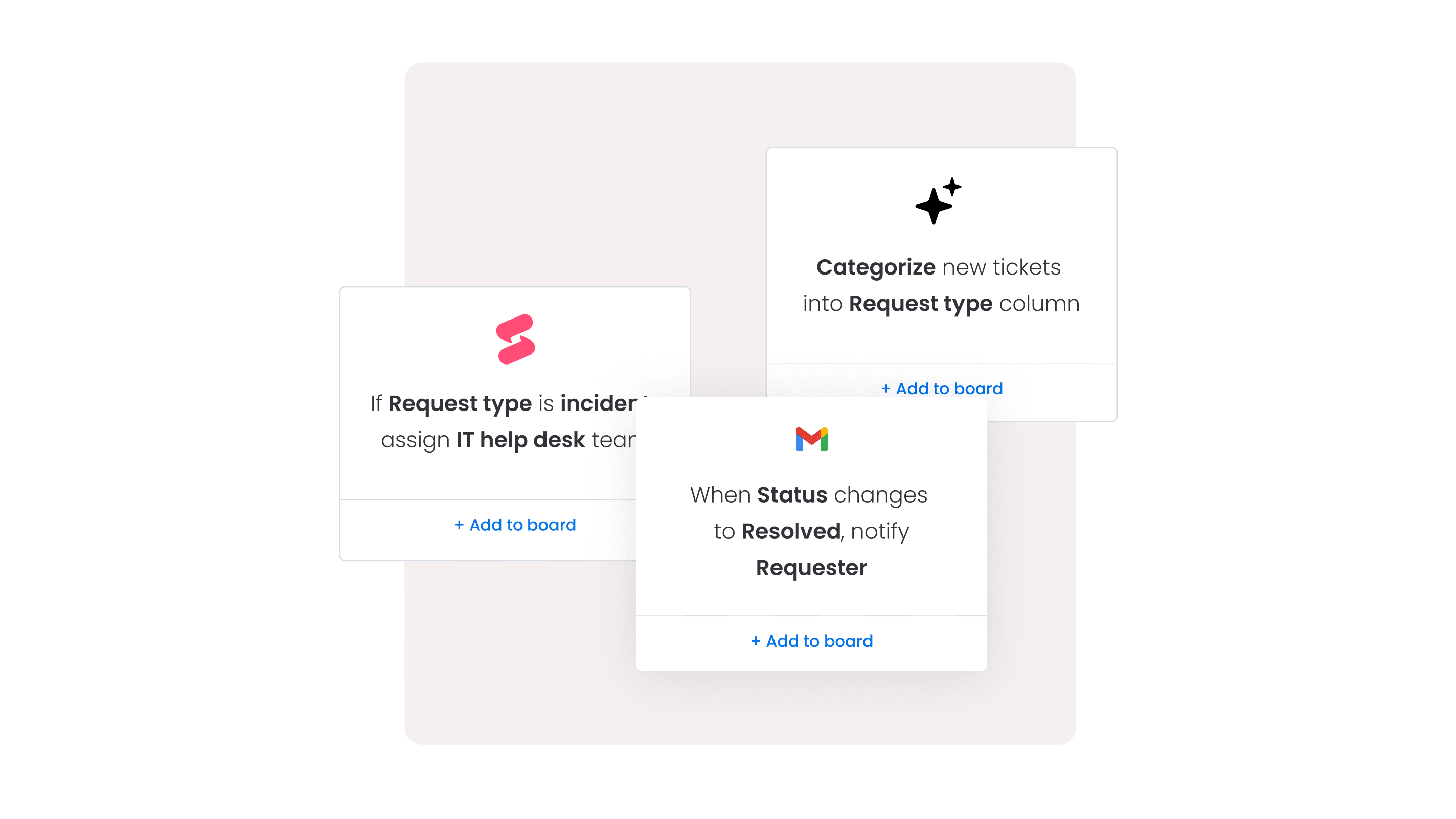
2. Build service workflows instantly with plain-language prompts
Instead of spending weeks configuring dashboards, forms, and automations, you can describe your needs in everyday language with monday magic. The platform creates a complete service workflow, ready to use and easy to adjust, so your team can start working in minutes.
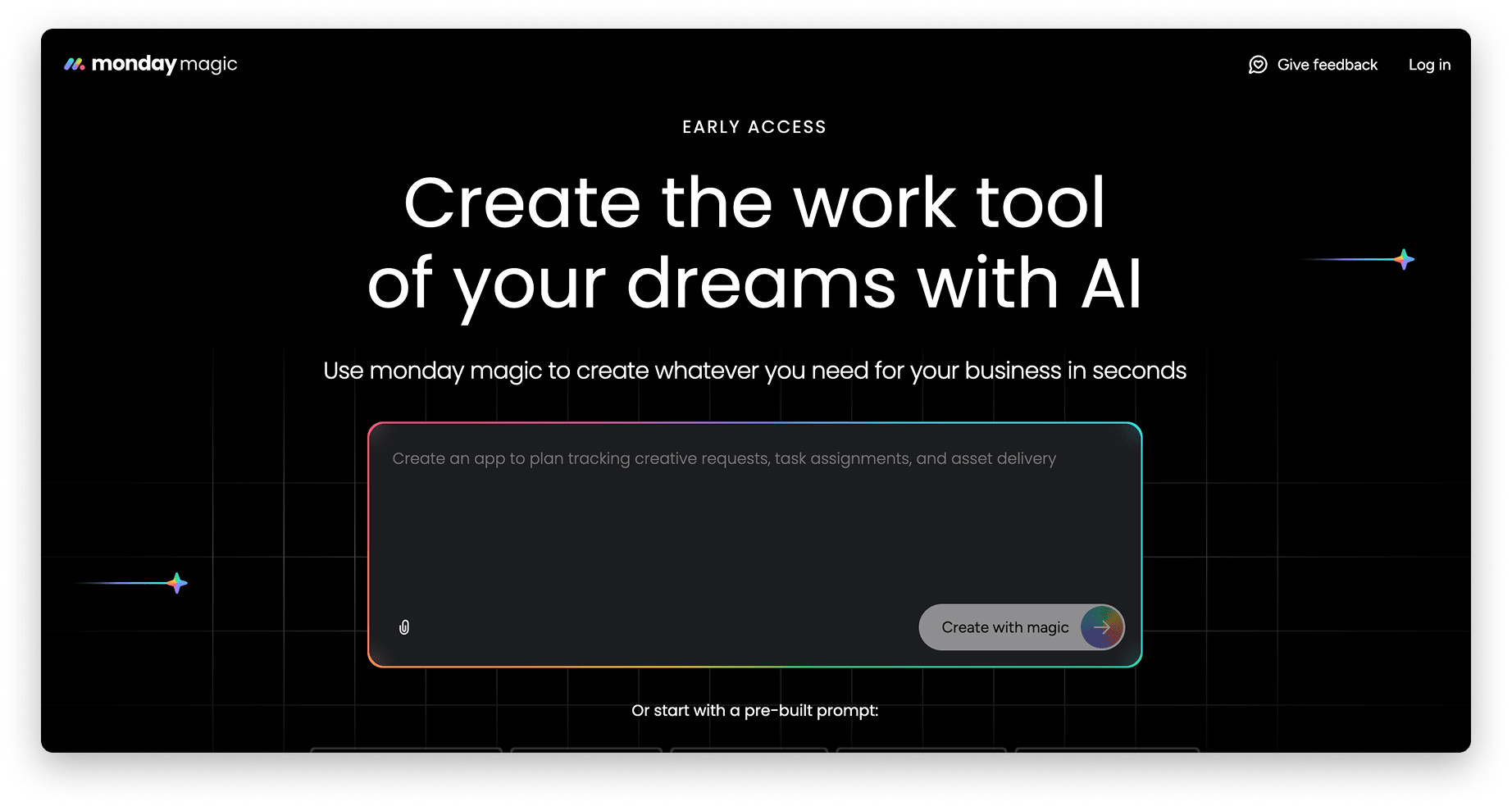
3. Customize beyond templates, without writing code
Every organization manages service differently. With monday vibe, you can design custom apps or extend your workflows in plain English, seamlessly connected to your data. It gives you enterprise-level flexibility without the complexity of traditional ITSM tools.
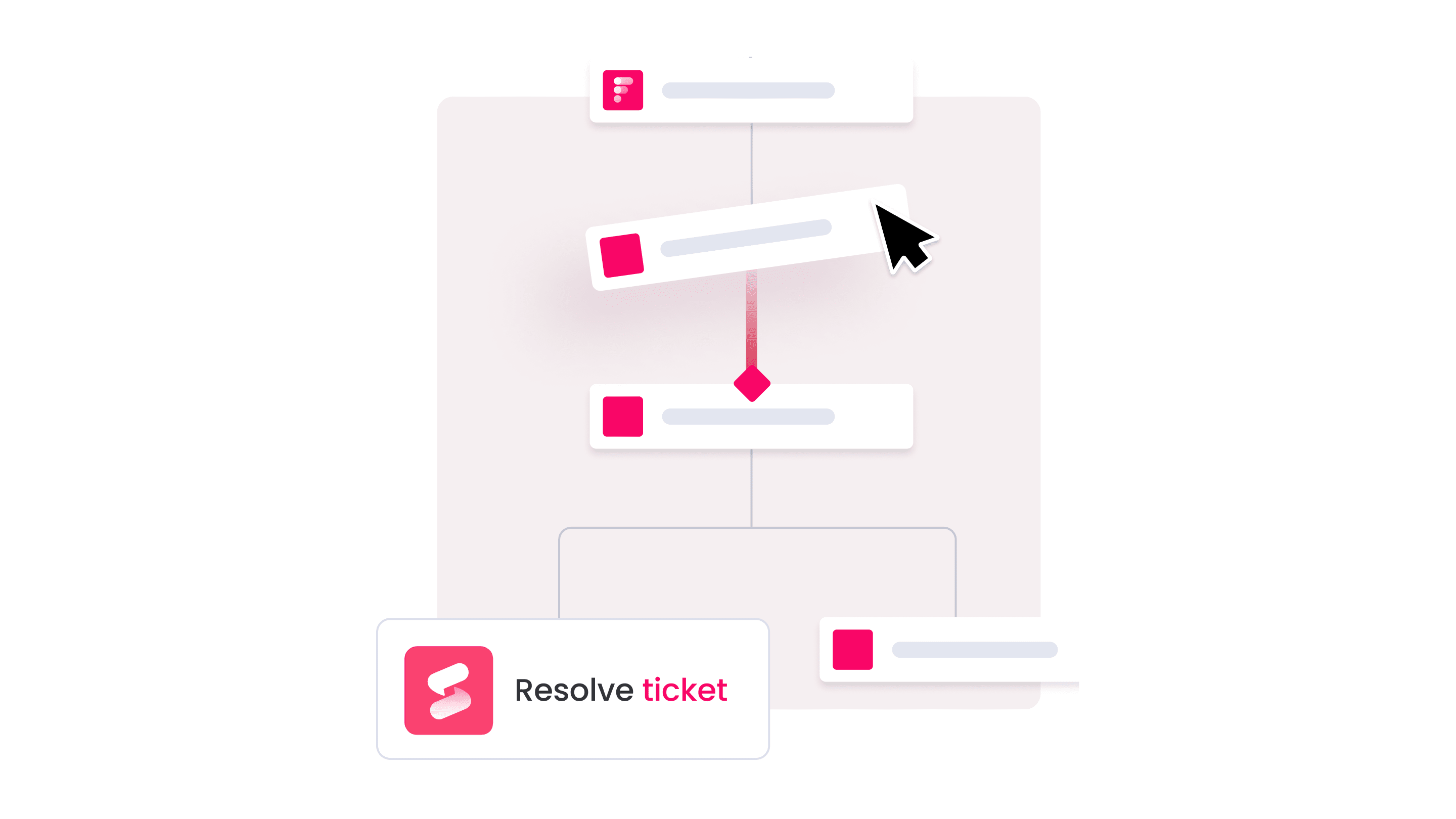
4. Empower a digital workforce to handle repetitive tasks
monday service goes beyond ticket tracking with its Digital Workforce — AI-powered agents that take on routine work like summarizing requests, escalating issues, or preparing reports. Your human team gains the bandwidth to focus on strategic initiatives while digital workers keep day-to-day operations moving.
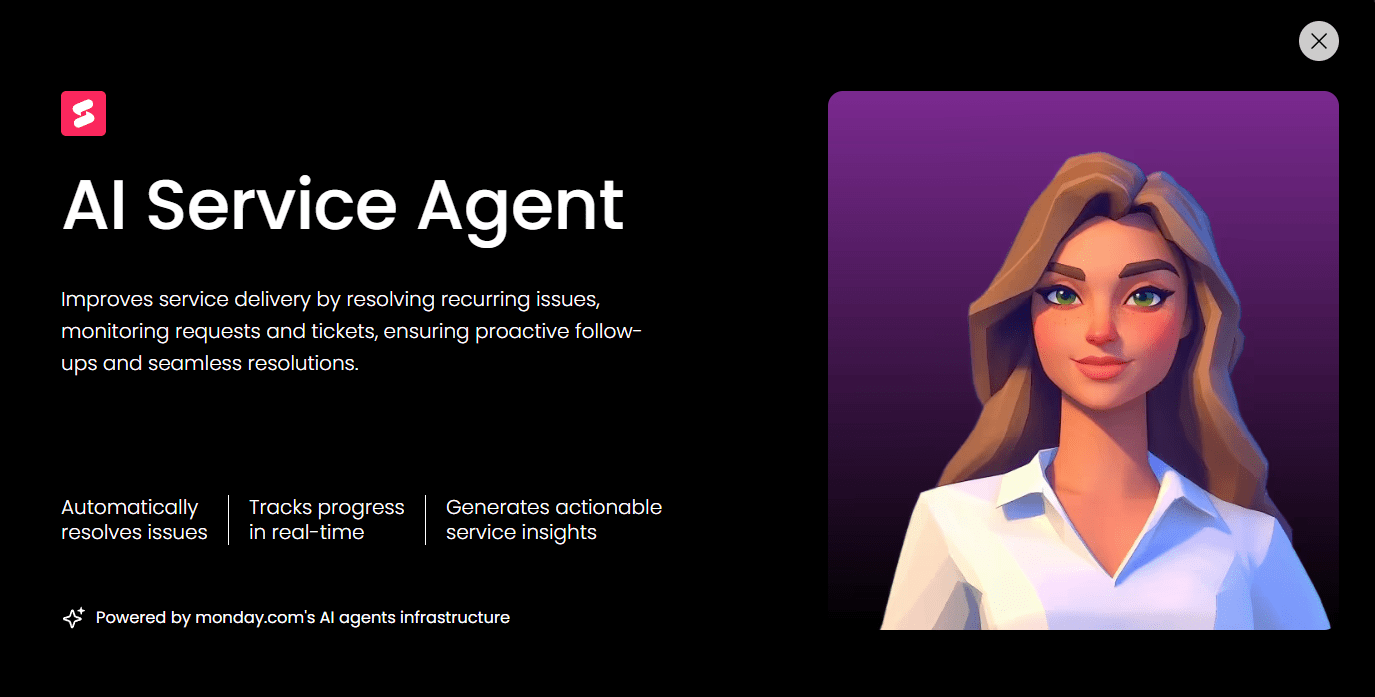
5. Gain real-time insights with intelligent analytics
Track SLAs, ticket volumes, satisfaction scores, and more in customizable dashboards enriched with AI capabilities like sentiment analysis, text extraction, and auto-summaries. Instead of drowning in raw data, you get actionable insights that help you predict trends and improve service performance.
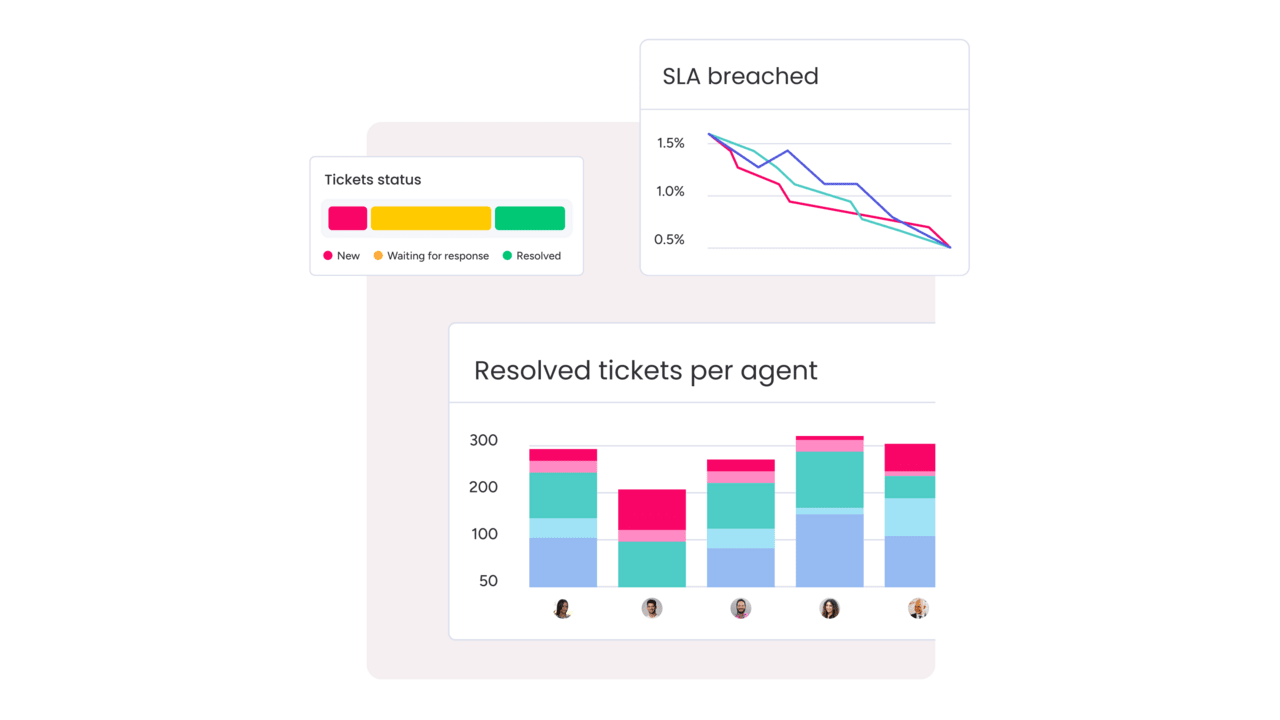
6. Scale with confidence thanks to transparent, secure AI
monday service includes 500 free AI credits per month, with clear options to scale usage as your organization grows. All AI features follow the same enterprise-grade security protocols, and monday.com never uses your data to train AI models, so you can innovate with confidence.
Transition seamlessly from Jira Service Desk to monday service
Moving your service operations from Jira Service Management to monday service is designed to be smooth and low-risk. Many teams complete the switch in stages using import tools and integrations. Here’s a typical path:
- Import core data: Use monday.com’s built-in Import to Jira Server tool to bring over service tickets, projects, and fields into new boards.
- Sync updates with a Jira integration: Activate the Jira integration and configure two-way or one-way sync to keep your changes aligned throughout migration.
- Map and adjust your workflows: After import, tweak your boards: map statuses, align custom fields, and configure automations to match how your teams worked in Jira.
- Validate data and clean-up duplicates: Check for missing data, duplicates, or mismatches.
- Train and onboard your teams quickly: Use monday service’s intuitive interface and free resources to bring agents quickly up to speed.
- Switch off Jira: Once you’re confident in your data, workflows, and integrations, transition fully to monday service and retire Jira.
It’s as simple as that. And once migrated, you’ll have a service desk that’s easier to use, powered by AI, and flexible enough to grow with your organization. Take a free trial of monday service to get started.
Try monday serviceFAQs about Jira Service Desk alternatives
What is the open source alternative to Jira service desk?
Popular open source alternatives to Jira Service Desk include osTicket, GLPi, and Zammad. These platforms provide basic ticket management, knowledge base, and reporting capabilities without licensing fees, making them appealing to smaller IT teams or organizations with strong technical resources.
Who is Jira's biggest competitor?
Jira Service Management’s biggest competitors include Zendesk, ServiceNow, Freshdesk, and monday service. Each offers IT service management and help desk tools, but monday service stands out for its ease of use, AI-driven automation, and strong customer ratings.
What are the main drawbacks of Jira Service Desk?
Common drawbacks of Jira Service Management (formerly Jira Service Desk) include a steep learning curve, limited self-service portal features, and performance slowdowns with large datasets or heavy customization. Many users also note that onboarding and setup can be time-consuming compared to more intuitive platforms.
How does monday service compare to Jira Service Desk in terms of pricing?
Jira Service Management starts at $19 per agent/month, but some advanced features are only available on Premium or Enterprise plans. monday service starts at $26 per seat/month, with AI automations, cross-department workflows, and customization included by default.
What is the best alternative to Jira for small businesses?
For small businesses, monday service is a strong alternative to Jira Service Management. monday service appeals with its simple, no-code setup and AI-driven workflows. It’s also easy to adopt, meaning you’ll see a rapid return on investment.
Is it possible to migrate data from Jira Service Management to another platform?
Yes, absolutely. You can migrate data from Jira Service Management to platforms like monday service using CSV exports, import tools, or Jira integrations. You might need adjustments for custom fields or SLAs, for example, but most vendors provide migration resources or support to ease the process.
Can a non-technical team member use a service desk platform effectively?
It depends on the service desk platform you use. Platforms like monday service are designed with non-technical users in mind, offering intuitive interfaces, templates, and no-code customization. While Jira is powerful, reviewers note it requires more training. On the other hand, monday service enables fast adoption across IT and non-IT teams alike.
How important are AI features when choosing a service desk solution?
AI is now a staple of modern service desks as customers expect instant answers, and agents need relief from repetitive work. monday service builds AI into the core of its platform, from automated ticket routing to Digital Workers that take action, helping teams resolve issues faster, deliver personalized support, and scale without extra headcount.
